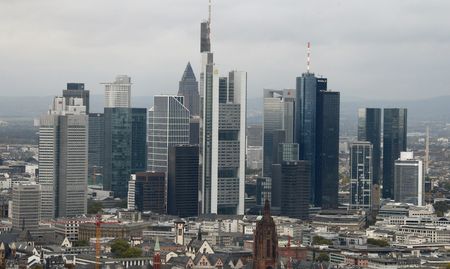BRUSSELS/FRANKFURT (Reuters) -Euro zone employment surged more than expected to a new record high last quarter as a surprisingly resilient economy avoided a recession, pointing to greater underlying inflation pressures that could keep interest rates high for longer.
The euro zone economy was expected to contract through the winter months but falling energy prices, a mild winter and unexpected flexibility in the economy propped up confidence, limiting damage for a bloc that still faces a difficult 2023.
Growth in the 19 countries sharing the euro at the end of 2022 expanded 0.1% quarter-on-quarter for a 1.9% year-on-year rise, in line with a preliminary estimate on Jan 31, Eurostat said on Tuesday.
But the real surprise was employment, which expanded by 0.4% on the quarter, twice as fast as expected in a Reuters poll, pushing the total number of workers to 165 million. Compared to a year earlier, employment growth was 1.5% in the final quarter of 2022.
Quick employment growth highlights just how tight the labour market is and signals a problem for the ECB in its fight to bring inflation back to 2% from double digit territory last autumn.
A recession was expected to boost the jobless rate, cooling the labour market and keeping a lid on wages. But firms, which struggled to rehire workers after the pandemic, appear to be hanging onto staff even through a downturn.
“The resilience of employment growth will aggravate the ECB’s worries about second round effects on inflation and reinforce the push for an extension of the hiking cycle beyond March,” said Ken Wattret, an economist at S&P Global Market Intelligence.
Wage growth was already expected to exceed 5% this year, the highest in years, adding to underlying price pressures, particularly in services where wages are the biggest cost.
While such a growth rate still signals a drop in real earnings given rapid inflation, some policymakers fear that it could be difficult to temper nominal wage demands once inflation declines, especially since workers lost a large chunk of their real incomes last year.
“The surprisingly large increase in employment in Q4 last year is the latest illustration of the euro zone’s remarkable resilience in the face of various headwinds,” Wattret added.
While overall growth in 2023 is still likely to be weak, the European Commission on Monday raised its growth forecast to 0.9% from 0.3%.
(Reporting by Jan Strupczewski and Balazs Koranyi; editing by Philip Blenkinsop and Christina Fincher)

